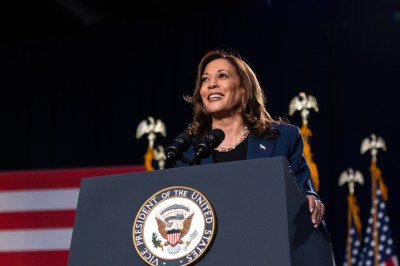Cocomentum is upon us.
Let’s get the to-be-sure stuff out of the way: As I have written before, I have a pretty low opinion of Joe Biden, but even if he were literally brain-dead, I think he’d be less of a threat to the country in the presidency than Donald Trump would. I believe Kamala Harris has a better chance of beating Trump than Biden did, but I also believe that Harris has less of a chance of beating Trump than a half-dozen other Democrats—Gretchen Whitmer, Josh Shapiro, Andy Beshear, Jared Polis, Wes Moore, Willie Nelson’s weed guy’s chauffeur’s personal masseuse, etc. If I were betting my own money on it today, I’d bet on Trump to beat Harris in November.
All that being stipulated, a few thoughts on how the Harris campaign might improve its odds.
Presidential elections in the United States are pure Kulturkampf. If they were about policy, Donald Trump would be another retired game-show host with a very active Twitter account, slightly to the left of Pat Sajak, and of no great interest. We have made the presidency into a kind of sacral kingship based on the idiotic notion that the president personifies the spirit of the nation in the way the British monarch does. (Formally, at least: King Charles the Mundane is no Elizabeth II.) The president has become a democratic idol in which the demos worships itself. But the demos is divided, with each half defining itself exclusively in opposition to the other half. Hence, the current situation in which alternating halves of the country believe we are in a state of existential crisis owing to the fact that the wrong kind of priest-king (Republican/Democrat, Catholic/Protestant, Hutu/Tutsi) occupies the national priesthood.
There is no way to campaign for the presidency in 2024 without making the campaign into a culture-war battle. Each party’s base demands above all that its candidate define the other party’s members—their fellow Americans—as enemies, and not only enemies of their respective parties but enemies of the nation and enemies of the good. That makes reaching out to the other side to try to pry away enough voters to build a comfortable majority coalition—what used to be known as normal politics—very difficult.
Instead, the most reliable winning strategy in recent elections has been to try to increase the turnout of one’s own base and, if possible, to build a sense of momentum that attracts uncommitted or weakly committed voters from the other side without subjecting the candidate to the desecrating indignity of treating members of the other party like human beings and fellow citizens and asking them for their votes. That would require—angels and ministers of grace, defend us!—asking them what it is that they care about most, what they want from government, and trying to accommodate them.
Them.
But Harris is going to need some of them if she wants to win. The Biden campaign did a piss-poor job of a great many things, but one of its worst pieces of political malpractice was how little effort it expended trying to reach out to the 10 to 20 percent of Republican primary voters who oppose Trump, who made a point of voting for Nikki Haley even after she was out of the race. Harris, who is largely unknown to most of the electorate—remember that if you are reading this article, you are not a normal American voter!—has a chance to do better on that score.
There are simple things she could do to wage her culture war in a less-Pyrrhic fashion.
For one, she could get serious about illegal immigration, which, being a child of two high-achieving legal immigrants, she is in a good position to do while telling any critics from within her own coalition to go pound sand. With the right increasingly hostile to legal immigration in a way that most Americans are not, she has an opportunity to back Republicans into a corner—but only if she can at least make people think she is serious about getting control of the border. And that won’t be easy, given the record of the administration in which she serves. But simply conceding that immigration anarchy is a problem—a real, legitimate, national problem and not simply a matter of white-guy panic—would be a good start.
Second, she could simplify her message on abortion to approximately this: “If Republicans in Congress try to pass a national ban on abortion, I will veto that bill.” That simple statement will remind pro-choice Democrats why they want her in the White House without imputing malice or bad-faith motives to moderates and uncommitted voters with pro-life sympathies who might be otherwise inclined to support her over Trump. And there are more than a few pro-lifers who would concede that vetoing such a bill would be at least defensible as policy inasmuch as it is not entirely clear that Congress has the constitutional authority to enact such a ban.
Third, when talking about gun control, she would do well to emphasize Congress’ role in such matters and the need for reform at the state and local level—reforms that can be helped along by federal resources and federal prodding. Promising a slew of undemocratic (and probably unconstitutional) executive orders to make an end-run around the legislative process would be a mistake as policy and probably a mistake as politics, too, cultivating unrealistic expectations on her own side and provoking fear and a sense of persecution on the other. Being a former prosecutor, she is excellently positioned to take my advice and make enforcing the god—mned laws the centerpiece of any national effort at reducing the criminal use of firearms. If you get brought in on a gun charge today in a big, Democratic-run city such as Philadelphia, the most likely outcome—overwhelmingly—is that you walk, that the charges are dropped or dismissed without a trial.
Harris could make dealing with that the focal point of her gun-crime agenda, rather than fixating on exotic weapons that are so seldom used in crimes that the FBI doesn’t even really bother to keep track of them. The overwhelming majority of gun crime in this country is committed with ordinary handguns and rifles, which are not going to be banned, in spite of whatever your favorite Democratic politician promises. If Harris and her team work forward from that blindingly obvious fact, they can come up with a package that is both reasonable as policy and, potentially, a political winner—or at least not as much as a political loser as gun control has been for Democrats in recent decades.
Given her background, Harris probably has a lot of people in her social and political circles who are far to the radical side of her on the progressive spectrum, as difficult as it may be for some non-Californians to imagine such people. She will be tempted to flatter their prejudices. But she doesn’t need to worry about hearing footsteps on her left: Left-of-center voters are going to vote for anybody over Donald Trump, and they’ll crawl over broken glass to vote for a progressive woman of black and South Asian background who isn’t already old enough to collect a Social Security check. She can afford to go looking for some votes in the middle.
Or she could take her chances on running an exclusively pump-up-the-base campaign, trying to beat Donald Trump in an outrage contest, and see where that takes her. My guess would be back to California.







Please note that we at The Dispatch hold ourselves, our work, and our commenters to a higher standard than other places on the internet. We welcome comments that foster genuine debate or discussion—including comments critical of us or our work—but responses that include ad hominem attacks on fellow Dispatch members or are intended to stoke fear and anger may be moderated.
With your membership, you only have the ability to comment on The Morning Dispatch articles. Consider upgrading to join the conversation everywhere.